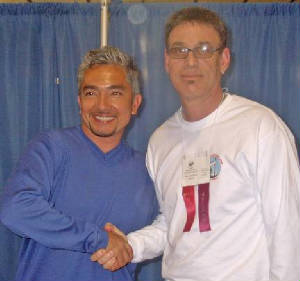Dealing with Digging
One of the most frustrating and costly behavior problems your dog can have is digging. I once had a client's dog dig up a water pipe and chew through it. In a single afternoon he caused around $60,000 worth of damage, destroying landscaping and a brand new deck! Needless to say, the owners of this dog were not happy when they called me.
While this amount of damage is uncommon, the fact remains that digging is a destructive act and is usually a constant source of stress for dog owners who have to deal with it.
There are a lot of "behavior band-aids" for digging. Most of them work sometimes, but none of them work all the time. I'll offer one of my favorites at the end of this article. However, I prefer a more thorough approach. With the dog who did all the damage to the deck and landscaping we never did anything to address the digging specifically. We didn't need to. All we had to do was change the way the dog viewed the world.
There are lots of reasons dogs dig. When your dog is digging next to the foundation of the house or the concrete slab of the patio or air conditioning unit, you can pretty much be certain that the dog is digging a cooling pit. He's too hot and is trying to cool off. That's not a behavior problem but a housing problem. If your dog is telling you he's too hot, provide a way for him to cool off! But don't punish him for trying to regulate his body temperature.
Other dogs dig to escape under the fence. Some like the soil in the flower beds while others tend to dig seemingly at random throughout the yard.
The number one solution I recommend for digging is to stop leaving the dog in the yard alone for long periods. Many people put their dog in the yard when they leave for work because they believe the dog likes it outside. Or they don't want to leave him "cooped up in the house all day". The truth is most dogs are perfectly happy to remain in the house while their owner's are at work. But even if the dog would prefer to be outside, his destructive behavior makes that a bad idea.
However, there are some people who need to leave their dog outside, for those people I recommend solid obedience training and at least one hour of face time with the dog per day. That can be outside, or inside (even if the dog has to be on the leash) but get that time to interact with the dog every single day. The combination of these two elements can be a powerful tool to prevent digging as well as most other behavior problems.
If you are dead set on the quick fix, here's one that I like a lot. If your dog has regular areas he digs get some inflatable balloons. Blow them up to near popping and bury them where the dog likes to dig. When his claws hit the balloon it will pop making a lot of noise and maybe throwing a little cloud of soil in the dog's face. The startle effect of this trick is often enough to make the dog abandon digging for good! But be warned, if the digging is stress related, he'll just redirect his stress elsewhere. He might stop digging only to start eating your stuff!
Marc Goldberg, CDT offers a complete solution to the boredom which causes digging in the first plae. Just call him so he can help your dog learn beneficial ways to use his energy and creativity....ways both you and your Chicago dog will actually enjoy. Dogs who learn to play fetch or Frisbee don't dig. But first your dog must learn to come when called, no matter what. Marc Goldberg can easily teach this to your dog. Don't believe it? Don't worry! Just call. We are the Chicago dog trainers who guarantee our work.
Our Philosophy & Goals
Our philosophy is simple. Improve the life of both dog and family. All too often, unruly dogs do not fully enjoy life because their families constantly become upset and frustrated with them. This is difficult for both family and dog.
Our mission is simple. Make both dog and family happy.
What does is take to make your dog happy? He will thrive when you give him leadership and attention.

Making the family happy is a bit more complex.
Families typically want their dog to:
- Come when called, every time, on or off leash
- Walk nicely on a loose leash without pulling
- Sit until released
- Down until released
Families also want their dogs:
- Not to jump on people
- Not to charge through doors
- Not to dig in the garden
- Not to bark and chew inappropriately
- Not to climb on furniture you prefer they avoid
- Not to sniff and eat off the table and counters.
- Not to be wild and uncontrollable
- Not to ignore you when you want their attention




